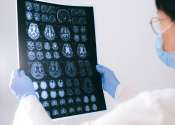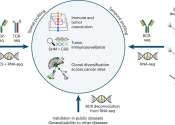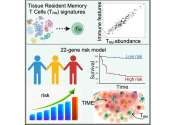Last update:
Oncology & Cancer news
Oncology & Cancer
People who experience side effects from cranial radiation therapy may recover full neurocognitive function within months
A substantial number of patients with brain metastases who experience cognitive side effects following radiation therapy may fully regain cognitive function, according to a pooled analysis of three large, Phase III clinical ...
12 hours ago
0
0
Oncology & Cancer
Radiopharmaceutical therapy offers promise for people with tough-to-treat meningioma brain tumors
A radiopharmaceutical therapy that has successfully extended progression-free survival for patients with neuroendocrine tumors shows early promise for delivering similar benefits to patients with difficult-to-treat meningioma, ...
16 hours ago
0
0
What is CAR-T cell therapy? Oncologist explains
Roughly 635,000 new cases of lymphoma were diagnosed worldwide, according to the World Cancer Research Fund International's most recent report. Survival rates for aggressive lymphomas have improved significantly thanks to ...
21 hours ago
0
0

Access to a GP can make all the difference in surviving lung cancer—and that is a problem for Māori
Surviving lung cancer in Aotearoa New Zealand could depend on whether you can access a GP—raising questions about equity in the country's health system.
22 hours ago
0
0

Circadian disruption, gut microbiome changes linked to colorectal cancer progression
Research from the University of California, Irvine has revealed how disruption of the circadian clock, the body's internal, 24-hour biological pacemaker, may accelerate the progression of colorectal cancer by affecting the ...
Sep 28, 2024
0
28

Study finds estrogens play a hidden role in cancers, inhibiting a key immune cell
Estrogens are known to drive tumor growth in breast cancer cells that carry its receptors, but a new study by Duke Cancer Institute researchers unexpectedly finds that estrogens play a role in fueling the growth of breast ...
Sep 27, 2024
0
52

Clinical cancer research in the US is increasingly dominated by pharmaceutical industry sponsors, study finds
Researchers at Fred Hutch Cancer Center identified a substantial increase over the past decade in the proportion of patients with cancer in the U.S. who participate in pharmaceutical industry sponsored clinical trials compared ...
Sep 27, 2024
0
14

Strategy to combat breast cancer involves two-pronged attack on enzyme that 'feeds' tumor
A study led by Brazilian researchers and reported in an article published in the journal Nature Communications proposes that simultaneously targeting the enzyme glutaminase and the protein HuR, both of which are essential ...
Sep 27, 2024
0
17

Mathematical model identifies effective drug combinations for non-small-cell lung cancer
Houston Methodist researchers have developed an advanced mathematical model that predicts how novel treatment combinations could significantly extend progression-free survival for patients with non-small-cell lung cancer ...
Sep 27, 2024
0
5

Molecular tumor boards improve identification of cancer-linked genes
Results from a new University of Kentucky Markey Cancer Center study show that molecular tumor boards can play an important role in identifying potential inherited cancer risks, leading to better patient care.
Sep 27, 2024
0
17

Omitting biopsy with negative MRI reduces detection of clinically insignificant prostate cancer: Study
Omitting biopsy in patients with negative magnetic resonance imaging (MRI) results is associated with a significantly reduced relative risk for detecting clinically insignificant prostate cancer, according to a study published ...
Sep 27, 2024
0
1

Disparities found for Non-Hispanic Black patients in hematopoietic cell transplantation use for hematologic cancers
Non-Hispanic Black patients in the United States appear to have persistent disparities in terms of hematopoietic cell transplantation (HCT) for various hematologic cancers, according to a study published online Sept. 18 in ...
Sep 27, 2024
0
0

Melanoma risk increased after radioactive iodine treatment for primary thyroid cancer, study finds
Patients with primary thyroid cancer who receive radioactive iodine therapy have an elevated risk for melanoma and other nonkeratinocyte skin cancers when limiting the cancer site to the head and neck, according to a study ...
Sep 27, 2024
0
0

Bacteria involved in gum disease linked to increased risk of head and neck cancer
More than a dozen bacterial species among the hundreds that live in people's mouths have been linked to a collective 50% increased chance of developing head and neck squamous cell carcinoma (HNSCC), a new study shows. Some ...
Sep 26, 2024
0
142

Unexpected immune response may hold key to long-term cancer remission
Results from a preclinical study in mice led by EPFL, and a collaborative clinical study in patients show that the type 2 immune response—associated with parasitic infection and thought to play a negative role in cancer ...
Sep 26, 2024
0
22

Large-scale study confirms well-established cancer risk factors and identifies new ones
Researchers have examined thousands of genetically defined traits to identify possible causal relationships for eight common cancers. The team evaluated data from more than 860,000 people to uncover potential factors in causing ...
Sep 26, 2024
0
3

Scientists develop CAR-T cells to target glioblastoma while sparing healthy tissue
Scientists at UNIGE and HUG have developed CAR-T cells capable of targeting malignant gliomas while preserving healthy tissue.
Sep 26, 2024
0
6

Genetic mutations in HRAS, KRAS genes linked to childhood cancers
Hereditary changes in genes are often the cause of rare diseases. For example, disease-causing gene variants (PVs) in the HRAS gene cause Costello syndrome and PVs in the KRAS gene cause Noonan syndrome and cardio-facio-cutaneous ...
Sep 26, 2024
0
1

Protein discovery advances quest for treatment for age- and cancer-related muscle degeneration
With the global population aging rapidly, sarcopenia, a condition that affects millions of older adults and severely diminishes their quality of life, is emerging as an urgent public health issue. Now, a new discovery by ...
Sep 26, 2024
0
0

Treatment-free remission for chronic myeloid leukemia
Leukemias are cancers of the blood cells. Chronic myelogenous leukemia (CML) is an uncommon type of cancer of the bone marrow, which produces blood cells. "Myelogenous" refers to the type of blood cells this leukemia affects. ...
Sep 26, 2024
0
0

Saving time with AI-generated treatment plans for breast cancer
Drawing in the organs of individual breast cancer patients and then creating precise radiation plans appears to be faster by using artificial intelligence (AI) models. That way, it remains just as reliable and accurate. It ...
Sep 26, 2024
0
0

AI could predict breast cancer risk via 'zombie cells'
Women worldwide could see better treatment with new AI technology, which enables better detection of damaged cells and more precisely predicts the risk of getting breast cancer, shows new research from the University of Copenhagen.
Sep 25, 2024
0
15

Engineers use bioprinted blood vessels to model deadly brain tumors
Glioblastoma is a brain cancer with very poor survival outcomes. Most drugs can't cross the blood-brain barrier, which means that unlike other cancers, there just aren't that many therapies available for brain tumors.
Sep 25, 2024
0
26

Promising drug combo targets aggressive bladder cancers
A new study in mice by researchers at the Herbert Irving Comprehensive Cancer Center (HICCC) has identified a promising drug combination for the treatment of muscle-invasive bladder cancer. Rosiglitazone plus trametinib worked ...
Sep 25, 2024
0
56

Combination treatment improves response to immunotherapy for lung cancer, mouse study shows
Researchers at the Francis Crick Institute, in collaboration with Revolution Medicines, have tested a combination of treatments in mice with lung cancer and shown that these allow immunotherapies to target non-responsive ...
Sep 25, 2024
0
31













































